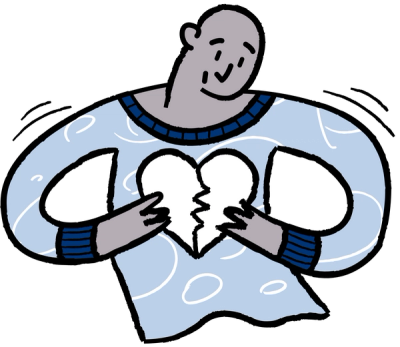Understanding and coping with suicide grief
Losing someone to suicide (also called suicide bereavement) can be a traumatic experience that feels different to other sudden losses.
In addition to pain and shock, it’s normal to feel like you’re in constant need of answers, regretful of things said or left unsaid, upset that you weren’t able to do anything to prevent the death, and worried about how others will treat you. It's also quite common to experience secondary losses for the dreams, plans, and special moments you won’t get to share with the person you care about.
The circumstances surrounding losing a loved one to suicide are complex and often confusing. The most important thing to know is that you’re not responsible for what happened and have no reason to blame yourself. It's okay not to have answers, even though it may not feel that way right now.
Even though many people have experienced the loss of a loved one to suicide, everyone’s journey is going to be different. Your thoughts and feelings will be deeply personal and there isn’t a right or wrong way to grieve. Remember - grief is a natural response to loss and an important way to make sense of what life looks like without your loved one while finding hope for the future.
On this page, you’ll find information on:
- How you might be feeling after losing someone to suicide
- Understanding suicide stigma and grief
- Tips for coping with suicide grief.
Scroll down to learn more.
Suicide bereavement support is available.
If you’d like to talk to about losing someone you care about to suicide, you can contact StandBy (1300 727 247) between 6am and 10pm (AEST), 7 days a week.
Alternatively, you can speak with a Lifeline crisis supporter 24 hours a day, 7 days a week via 13 11 14, text, and chat.
How you might be feeling after losing someone to suicide grief
Grief after any type of loss can bring up a range of different thoughts and feelings and impact your mental and physical health.
While everyone is going to grieve in their own way, we’ve listed common experiences people have reported following a suicide loss. It’s okay if you’re experiencing none, some, or all of these. No matter what you’re feeling right now, it’s valid.
Grieving a loss by suicide can bring up feelings of:
- Shock and disbelief
- Guilt and self-blame
- Numbness
- Anger and irritability
- Anxiety
- Loneliness and isolation
- A need for answers
- Shame
- Betrayal, rejection, or abandonment
- Deep sadness
- Relief.
Relief can be a tricky emotion that sometimes comes with grief, often followed by feelings of guilt. If you supported the person you lost through years of mental health challenges, it’s natural if you feel some relief that they’re no longer suffering.

It’s important not to judge your feelings or emotions and to accept them as part of your healing journey.
Click here to learn more about the feelings and effects of grief.
Suicide grief and mental health
Losing someone you care about to suicide is a distressing life event and can potentially lead to various mental health challenges, including substance misuse, self-harm, anxiety, depression, post-traumatic stress disorder (PTSD), and potentially your own suicidal thoughts.
It’s okay if you’re struggling to cope, but it’s important to reach out for help and support. As isolating as grief can feel, you’re not alone in your pain, and there are people who want to help. You can contact Lifeline 24 hours a day, 7 days a week.
Understanding suicide grief and stigma
While much of the world has come to understand that there is nothing shameful about suicide, there is still work to be done to reduce suicide stigma and correct the myths and misconceptions in many communities.
If you’ve been bereaved by suicide, stigma can be particularly challenging, as it may leave you feeling:
- Ashamed and afraid to reach out for support
- As if your grief isn’t valid (also known as disenfranchised grief)
- Pressured to ‘get over it’ and move on
- Spiritually and/or religiously conflicted
- Abandoned and isolated by those closest to you.
No matter what grieving looks like for you, your responses and emotions are valid. There is no need to feel shame about how your loved one died. Everybody deserves support, including you.
If it feels like people in your life are pulling away, it might not necessarily be caused by stigma. After any type of loss, it can be difficult for others to know what to say or how to offer support. It’s normal to experience relationship problems and to feel disconnected from friends and family members.
If you feel like you’re struggling to connect and communicate with others, you can find information and resources from organisations like Relationships Australia and StandBy.
Healing through knowledge
When you’re ready, learning about suicide can be an empowering step toward healing. This knowledge may also help you feel more prepared for conversations with others and encourage you to speak with someone you trust about what you’re experiencing.
By educating yourself, you can gain a deeper understanding of the factors that contribute to suicide, clear up misconceptions, reduce self-blame and guilt, and learn respectful ways to talk about suicide.
Using sensitive language when referring to suicide is important because it helps to honour the person who has died while avoiding further stigma or distress for the person you’re supporting.
Below, you can learn ways to speak respectfully about suicide.
- Respectful terminology for speaking about suicide
- Died by suicide
- Suicided
- Ended their life
- Took their own life
- Non-fatal suicide attempt.
For more information, you can download StandBy's fact sheet on managing social stigma after suicide by clicking here.
- Stigmatising terminology for speaking about suicide
While seeking answers and education is valuable, it’s important to be mindful of how it impacts your mental health.
For example, if constantly researching suicide-related topics brings up intense emotions that make it difficult to cope, consider taking a step back and prioritising your wellbeing.
If you’d like to talk to a counsellor about losing someone you care about to suicide or be connected with local support services, you can contact StandBy (1300 727 247) between 6am and 10pm (AEST), 7 days a week.
And remember - you can speak with a Lifeline crisis supporter 24 hours a day, 7 days a week via 13 11 14, text, and chat.
Tips for coping with grief after losing someone to suicide
Coping with grief involves acknowledging all of your emotions and expressing how you feel without judging yourself. As unexpected and uncomfortable as the grieving process can be after losing someone to suicide, it’s an essential part of healing and finding a way to move forward with your life. It's also important to set realistic expectations for your grief journey.
Healing from the loss of a loved one to suicide doesn't follow a specific timeline. Some people may start feeling better after a few months, while for others, it may take years.
“Try not to compare your healing to others; grief is not linear and no two grief experiences are the same.”
Below, we’ve listed strategies and resources that can help you throughout your grieving process. What works for someone else might not work for you and that’s okay. The most important thing is that you’re going at your own pace and reaching out for support when needed.
- Practise self-compassion
When experiencing suicide grief, it's common to blame and criticise yourself. It’s important to remember that you are not at fault and you are not to blame. Try to be kind to yourself as you would be to a close friend in your situation.
For example, if you catch yourself thinking, ‘I should’ve done more,’ gently challenge that thought and replace it with something kinder like, ‘I did the best I could with what I knew at the time.’
Click here to learn more about the importance of self-esteem and mental health.
- Prioritise and practise self-care
- Explore strategies for managing emotions
- Lean on your support network
- Consider counselling or therapy
- Join a suicide bereavement group
- Reflect on what matters
Supporting children and young people after suicide loss
When children and young people experience a traumatic event, such as the loss of someone close to them to suicide, they often express their grief in indirect ways.
For example, while adults might cry about their loss, talk openly about their feelings, or seek support from others, a toddler, child, or young person might:
- Act clingy and become easily upset
- Experience changes in sleep and appetite
- Revert to baby-like behaviours, such as thumb sucking, and bedwetting
- Show signs of separation anxiety or school refusal
- Have frequent mood swings
- Constantly ask about the future
- Display anger and aggression
- Begin using alcohol or other substances
- Withdraw from family, friends, and activities they once enjoyed.
Most children understand the concept of suicide from an early age, so it’s important to be honest with them about what happened and acknowledge their feelings. This is particularly important if the person a young person lost was a parent, sibling, partner, or someone else close to them.
Tips and resources for speaking with kids and teens about suicide
- Do: Explain that it was a suicide death
- Don’t: Go into graphic details
- Do: Use age-appropriate language
- ‘They were sad and in pain and their body wasn’t able to keep working.'
- ’They won’t be here anymore and it’s okay to feel sad.’
- ‘We can talk about it whenever you want.’
- Don’t: Use figurative language (e.g. ‘They went to sleep.’ or ‘They left us’.)
For more resources to help children and young people cope with suicide grief, you can download the free books created by StandBy below.
- A book just for me – a grief journal (for children under 12) and accompanying notes*
- Includes activities and prompts to help children identify and express their feelings.
- My grief journal - for grieving teens (for 13 +) and accompanying notes*
- Provides activities and exercises that help teens seek help, cope with their grief, and find healthy ways to talk about their emotions.
*The notes provide additional guidance and support for both teenagers and their adult support network.
You can learn more about speaking with kids and teens about suicide by visiting StandBy's website.
It’s also important to be open about your grief. Children often take emotional cues from the adults around them, and expressing your feelings can help them understand and process their own grief.
To support children and young people through their suicide grief, you can:
- Create and stick to routines
- Talk about happy memories of the person you lost
- Put together a photo album or box of keepsakes
- Build a support network. (If there are other adults in the child or young person’s life (like a teacher), let them know what happened so they can offer additional support.)
Grieving after suicide can be a long and challenging experience.
As you process your grief, it’s important that you’re kind and patient with yourself. It’s okay if you need extra time to process and accept the loss due to the nature of the death.
Have you been impacted by suicide in another capacity?
Our Touched by Suicide: Wellbeing support guide is for anyone impacted by the suicide death, suicide attempt, or suicidal behaviour of someone they are not closely related to or directly connected with.







